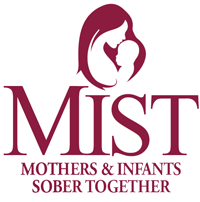MIST: Mothers and Infants Sober Together
- Need: To address the needs of pregnant women who are using substances and infants born into drug-positive families.
- Intervention: The Mothers and Infants Sober Together (MIST) program assisted mothers who used substances in getting treatment and provided a safe, drug-free home for themselves and their newborn.
- Results: MIST has helped mothers find treatment and education and has helped children grow up in safe and healthy homes.
Description
Babies born whose mothers used opioids during pregnancy, or were receiving buprenorphine due to medication assisted treatment, are born exposed to the drugs and experience withdrawals once born. Children born drug positive have special needs. With East Tennessee's high number of neonatal abstinence syndrome (NAS), it is important to secure these women in treatment early on in their pregnancy.
 In order to help mothers access
substance abuse treatment and properly care for their
children, the
Mothers and Infants Sober Together (MIST) program was
formed in 2006 through the Ridgeview Behavioral Health
Center. The program's mission was to improve the
quality of life and daily functioning of drug-exposed
infants and families.
In order to help mothers access
substance abuse treatment and properly care for their
children, the
Mothers and Infants Sober Together (MIST) program was
formed in 2006 through the Ridgeview Behavioral Health
Center. The program's mission was to improve the
quality of life and daily functioning of drug-exposed
infants and families.
The program, which started small, eventually expanded to include Anderson, Roane, and Campbell counties in Tennessee. The program provides case management, group, and individual therapy to pregnant women and mothers with drug-exposed infants.
Many clients come from referral sources such as:
- Department of Children Services
- Obstetrics and gynaecology (OB/GYN) doctors
- Anderson, Roane, and Campbell County Juvenile Court
- Health departments
- Community probation services
- Treatment providers
- Self-referral from clients
This program received support from a 2006-2009 Federal Office of Rural Health Policy Rural Health Care Services Outreach grant.
Services offered
The program team consists of case managers, a therapist, and a program coordinator. Together, the team works with mothers to create a stable, drug-free environment for their infants and the families. To be eligible for services, mothers must test positive for substances during pregnancy or at time of birth and/or admitted to using drugs during the pregnancy. The majority of the women that MIST serves use opiates, Suboxone, tetrahydrocannabinol (THC), and methamphetamine.
MIST provides Same-Day Access for initial appointments. Next Day Medication Management is initiated following the assessment where a psychiatrist evaluates the patient and can prescribe medication-assisted treatment (oral or injections) or referrals to additional MAT treatment using Suboxone or Subutex. Providers use a methodology called Just-in-Time to prescribe dosages to help mothers with medication management.
Additional services include:
- Home visits
- Mental health counseling
- Substance abuse treatment
- Relapse prevention
- Parenting education
- Supervised visits for mothers without custody of their children
- Case management
- Weekly support groups
- Individualized treatment plans
- Individual therapy
Results
From August 2009 to June 2016:
- 942 referrals were received by the MIST Program from various agencies
- The average age of a MIST client was 24, with the youngest client being 13 years old and the oldest client being 41.
- The program has had an increase of pregnant women join
- Many women successfully detox before giving birth, with the assistance of their OB and Subutex doctors.
- Drug-free, healthy babies have been born to women who were previously addicted to drugs during pregnancy
MIST has caught the attention of local and national media outlets:
- NPR's All Things Considered radio show and website, November 18th, 2015
- "Mothers' Helper," Better Tennessee
- "Ridgeview Pioneers Program for Drug-Addicted Mothers," Oak Ridge Today in September, 2015
Challenges
MIST has continuously faced barriers to reaching pregnant women for substance treatment and detox. The enactment of the Tennessee Fetal Assault Law of 2014 led to a greater number of women who avoided discussing their substance use for fear that they would be arrested. This law expired on July 1, 2016.
The program continues to work towards substance use prevention in communities, providing medical resources to spread the word about available treatment. A preeminent goal is to establish the reputation of being a welcoming place of assistance, making women feel comfortable and empowered.
Replication
Organizations wishing to bring something like this to their area should find a clear plan for sustainability. They should also work closely with area law enforcement, judges, healthcare workers, and mental health centers in order to be the most effective.
Contact Information
Melody Morris, LADAC, SUD/OUT Program ManagerRidgeview Behavioral Health Services
Mothers and Infants Sober Together
865.482.1076 ext. 1289
morrisml@ridgeview.com
Topics
Appalachia
· Children and youth
· Maternal health and prenatal care
· Substance use and misuse
· Women
States served
Tennessee
Date added
January 24, 2007
Suggested citation: Rural Health Information Hub, 2023 . MIST: Mothers and Infants Sober Together [online]. Rural Health Information Hub. Available at: https://www.ruralhealthinfo.org/project-examples/380 [Accessed 2 March 2026]
Please contact the models and innovations contact directly for the most complete and current information about this program. Summaries of models and innovations are provided by RHIhub for your convenience. The programs described are not endorsed by RHIhub or by the Federal Office of Rural Health Policy. Each rural community should consider whether a particular project or approach is a good match for their community’s needs and capacity. While it is sometimes possible to adapt program components to match your resources, keep in mind that changes to the program design may impact results.
